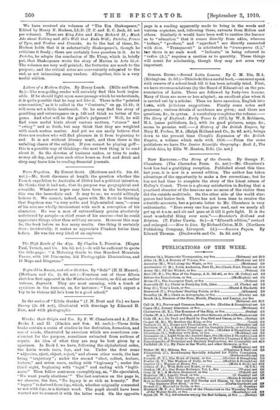Words : their Origin and Use. By F. W. Chambers
and A. J. Ker. Books I. and II. (Blackie and Son. 8d. each.)—These little books contain a series of studies in the derivation, formation, and use of words, illustrated by exercises which are sometimes con- structed for the purpose, sometimes extracted from authors of repute. An idea of what they are may be best given by a specimen. In Book- I. we have, following the alphabetical order, the Latin words jade, lego, and lex. Under the first come '• adjective, eject, object, reject," and eleven other words, the last being " trajectory "; under the second "elect, collect, lecture, lectern," and seven more, ending with "legionary " ; under the third eight, beginning with "legal" and ending with "legiti- mate." Then follow sentences exemplifying, as, "He ejaculated, 'We want yearly elections?" The last sentence on the page is, we observe, the line, "No legacy is so rich as honesty." But " legacy " is derived from ldga, which, whether originally connected or not with ijeo, is a distinct word.. The pupil should have been warned not to connect it with the latter word. On the opposite page is a reading apparently made to bring in the words and various cognates, and, following these, extracts from Milton and others. Similarly it would have been well to caution the learner as to " education " that it comes directly from eclelco, whereas "induce," "produce," and " aqueduct ". are directly connected with dreco. "Transparent" is attributed to "trans-puree (L.)," bat there is no such word. "Indicate," in being referred to " inelico (L.);" requires a caution as to quantity. These things will count for scholarship, though they may not seem very important.










































 Previous page
Previous page